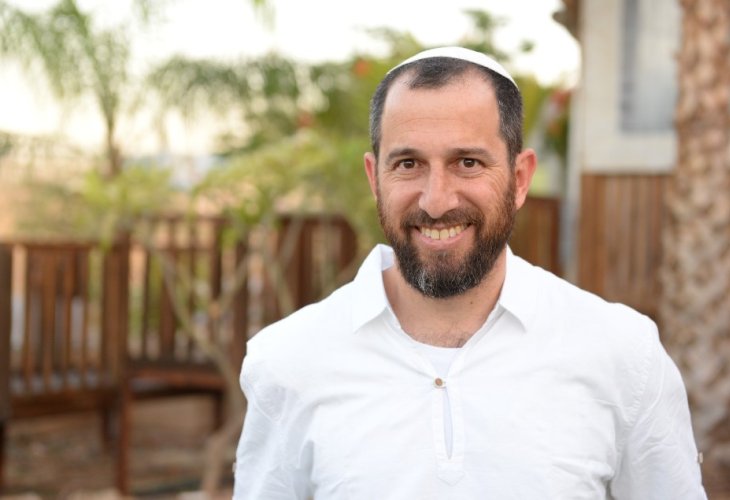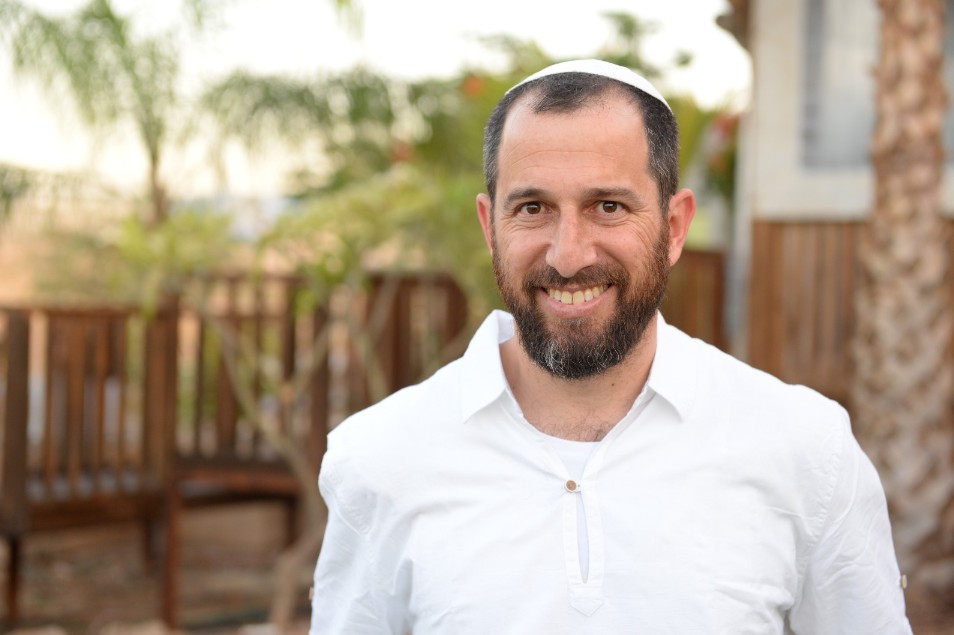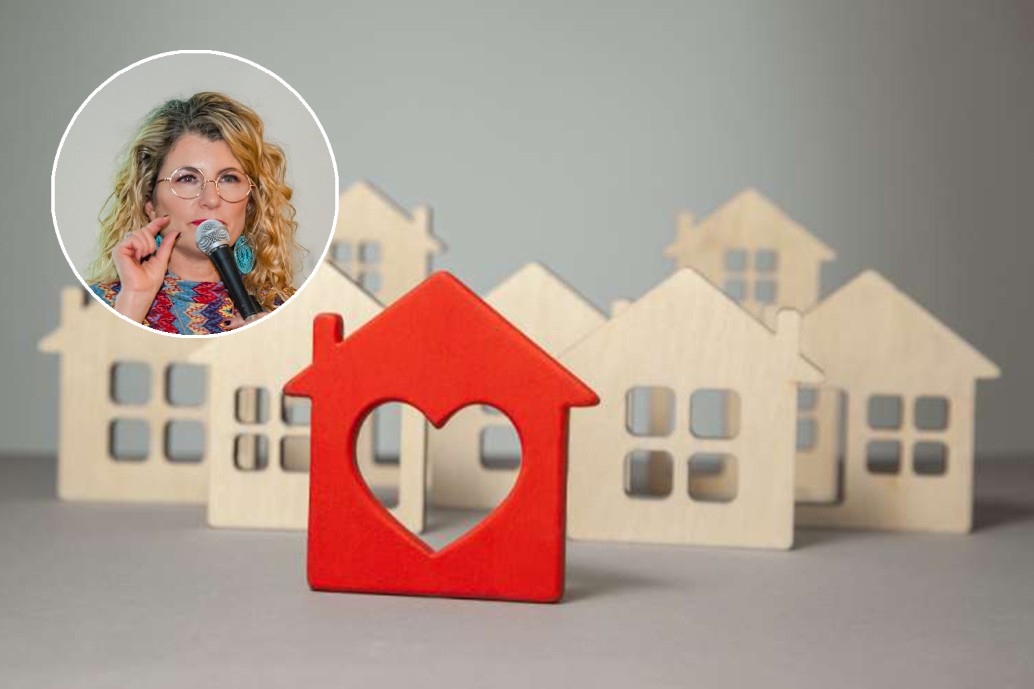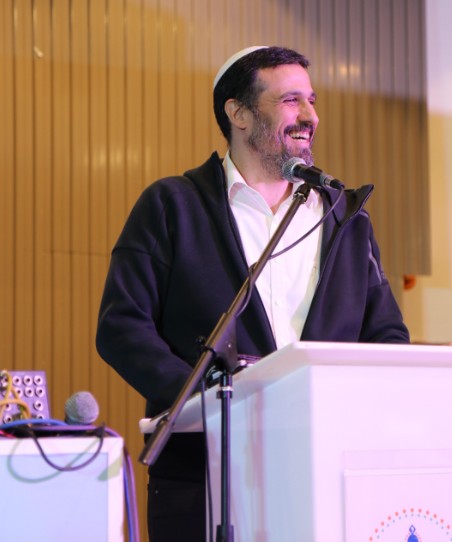"Unknown Heights: Relationship Experts Offer Golden Tips for COVID-19 Times"
The COVID-19 crisis presents many families with the challenge of maintaining a happy family life under the pressure cooker environment of quarantine. To help, we enlisted relationship experts Moshe Sharon, Rabbi Naftali Marcus, and Sharon Adam, who share their golden advice that could change your life in these tough times and accompany you in the future.
 Rabbi Naftali Marcus (Photo: Noa Teimans)
Rabbi Naftali Marcus (Photo: Noa Teimans)Not long ago, no one imagined that the daily routine of many families in Israel would look like it does today. However, in recent weeks, it has become clear once again that reality surpasses imagination. The rapidly spreading coronavirus across Israel, along with strict isolation guidelines, forces almost every Israeli citizen to stay confined to their homes, except for urgent and necessary outings.
This situation naturally creates many family challenges, both in terms of relationships and in the complex dynamics with children. To address these issues, we spoke with several experts in these fields who helped us navigate this period in the best way possible. The observant among us will notice that the experts' good advice can and should be applied throughout the rest of the year.
 (Photo: shutterstock)
(Photo: shutterstock)The Secret of the Emotional Bank
The first expert we spoke to is Rabbi Naftali Marcus, a teacher at the Noam Yeshiva, who also works in counseling singles, groom guidance, and marriage mediation. Rabbi Marcus focused on golden tips for managing a good marriage and preventing stress at home during the coronavirus crisis. "In the situation imposed on us," he says, "there's more opportunity for arguments. Spousal disputes that hovered beneath the surface in the hustle of life are exploding in our faces, and children also fight much more due to constant friction between them."
It is certainly understandable. Constant presence in the same four walls can be very challenging.
"It is understandable, but it's not a decree of fate. It can be different. Have you ever thought about what makes a small, seemingly insignificant word trigger an overreaction? And why does a spouse sometimes ignore a hurtful comment and other times respond harshly? To understand this, it's worth knowing the 'emotional bank mechanism' well described by famous mentor Stephen Covey. According to him, in every relationship, especially in romantic relationships, there's an emotional bank. This bank works like a monetary bank where money is deposited. Good words, gifts, positive attention, apologies if I've hurt, genuine listening, and honesty are deposits in the emotional bank. In contrast, withdrawals are insults, offenses, and other negative interactions. To sum up, the deposits give the partner a good feeling, while withdrawals do the opposite. As with a financial bank, if you've deposited a lot and withdrawn little, your situation is good.
"Exactly the same," says Rabbi Marcus, "is true for relationships. If you've deposited many things that make your partner happy in the emotional bank of your relationship, then even if you withdraw by saying a few unpleasant things intentionally or unintentionally, your situation will still be good, and this feeling will pervade the relationship - the situation is good. But if the situation is reversed, with endless withdrawals because you're hurtful and insulting, then even if you deposit a little, it won't improve much. You'll still be in the red. Therefore, every critical word you say will elicit strong reactions from your partner."
Moreover, according to Rabbi Marcus, these principles are based in the Torah, and he cites what is said in the Talmud tractate Sanhedrin: "The Talmud instructs regarding the relationship to women and children - 'A child and a woman - the left hand should reject, and the right hand should bring closer.' What the Talmud essentially tells us here is that in the relationship between a parent and their children, and between a husband and wife, the weak hand - the left - should distance, and the right hand - the strong hand - should bring closer. That is, the main relationship should be reinforcement rather than criticism. Deposits instead of withdrawals. This is the healthy balance. We're not afraid of withdrawals, but it's important that they're timely, appropriate, and measured. Even Hashem, in His love for us, causes us pain sometimes, as it says in Proverbs: 'For Hashem rebukes the one He loves.'"
So, how can we determine the optimal balance between 'deposits' and 'withdrawals'?
"The sages give us a general guideline and say that the withdrawals should be fewer than the deposits. If you want to talk about a more precise ratio, I can tell you that researchers have found that the ratio that will make a couple happy is 1 to 20. That is, for every 20 deposits, one withdrawal. It may sound unrealistic to some, but I want to say that it's possible. And it's a great message. It does require personal development, but it's definitely achievable.
"If the culture in our home is one of appreciation, praise, and spreading good words in abundance, then even if someone hurts the other, it probably won't lead to an explosion. Honestly, if you open your eyes, even slightly, you'll see there's no shortage of things to appreciate. From the smallest things to the biggest. We all, simply all of us, yearn for good words, warmth, and love. It's so simple, yet so important."
 Rabbi Naftali Marcus (Photo: Noa Teimans)
Rabbi Naftali Marcus (Photo: Noa Teimans)'Return to Your Treasures'
The second expert we spoke with is Sharon Adam, founder of the 'Complete Human' Center, a lecturer, and facilitator of listening circles and body and soul processes. "A few days ago, I received a call from a friend who decided to share what's happening in her life. She said to me, 'In the first four days of the lockdown, my husband and I each retreated into our own private sanctuaries - me in my room, reading, listening to lectures, watching videos, and talking, and he in the living room in front of the TV or on his phone. We hardly spoke, and each was in their own world. After a few days of this, I just lost it when I saw him watching the news again, worried. 'Enough with the news!' I shouted at him. 'It's increasing the anxiety.' And really, how much can you spend time with the same person? I'm going crazy.'"
"I listened carefully, not rushing to respond. I was in a similar situation just moments ago, almost losing my sanity. Nevertheless, after a few seconds, I began to answer her: 'This is the time to be joyful, to light up the world, to believe that everything is for the good.' My reply didn't satisfy her, and she continued, 'It bothers me that he's feeding the anxieties instead of practicing positive thoughts, like I'm trying to do.' 'And why not?' I answered her, 'According to Hasidic teachings, everything you see outside is what's inside you.
'The person standing before you is a messenger of your subconscious,' I told that friend, 'so instead of 'killing' the messenger, thank him. Apparently, you're repressing anxiety, and thanks to him, you managed to see it. From now on, whenever you feel like blaming him, tell him: 'Thank you, my dear husband, for showing me what's blocking me from being the light that I am."
So, what do you think we should focus on now?
"Connecting to love is always good, but especially now. Open your heart. Don't fear. Sometimes you need to reach a breaking point with a deep understanding that now is the time to remove the masks and clear the internal lies. The more I listen to my heart, the more I understand that what's needed now in relationships is compassion, gentleness, and healing. Let's see how you look inward and change your reality. Become a helper, clean the resistance within, and stop running away. Only when we become the thing itself - love and only love, releasing the ego and connecting to the heart, both in relationships and towards the children, will unity occur within us. Don't search outside. Look within yourself. As Rabbi Nachman says, that's what Hashem asks of us: 'Return to your treasures and use them.'"
 (Photo: shutterstock) In circle: Sharon Adam
(Photo: shutterstock) In circle: Sharon AdamNo 'On-the-Way' Criticism
The third person interviewed in our article is Moshe Sharon, a lecturer on Judaism, couples therapist, trainer of coaches and couples therapists, and author of six books, including the bestseller 'Couples Couples.' When we asked Sharon for his advice on maintaining a happy marriage during the coronavirus crisis, he offered five important tips for the matter.
"We are in a complex period," he says. "The family has completely left its regular routine and entered a kind of pressure cooker. Most of the time, everyone is at home, so the tension rises. The future is uncertain, and besides faith, there's nothing holding our heads above water in hope and optimism. In such a situation, the last thing couples need now is an argument, a cold war, miscommunication, or blame exchange.
"So, the first thing I want to talk about is replacing exclamation marks with question marks. Many couples communicate in commands, which creates a disrespectful atmosphere. You have no idea how many couples improved their respectful communication thanks to the following advice: replace exclamation marks with question marks. For example, instead of saying: 'Prepare lunch for the kids and then go shopping,' it's better to ask: 'Can you prepare lunch before you go shopping?'
"The second thing to remember is that you should always be on your partner's side, not against them. We constantly need to remind ourselves what side we're on. People often choose the opposite side of their partners. It's a natural balancing need, but the problem arises when the partner speaks from a certain emotional place needing empathy, and we choose to confront them with the opposing side or justify the one who hurt them.
"Therefore, regarding this matter, I recommend this: no matter what your wife says (and it's true for both sexes), first, be on her side, strengthen and support her. Then, if you have something to say that differs from her viewpoint, wait a while, and then ask: 'Do you want to hear how I see it? Do you want to hear another perspective on the matter?'
"It's important for everyone to remember that their spouse is dealing with the whole world. They need at least one safe space, so we should give it to them. For example, in this regard, it's worth mentioning that a sentence you shouldn't say might be: 'Your sister is really right, I've been telling you for years that you're too loud.' Instead, the more appropriate thing to say is: 'You? No way! What are you talking about? The opposite is true. Your sister can criticize your parenting as much as she wants, but to me, you're an amazing mom."
 Moshe Sharon
Moshe SharonAnd what can be done about the fact that spouses often think and operate differently?
"At this point, my third piece of advice deals with – rejoice in the differences between you. They are a blessing. They are a gift. There are quite a few subjects where there are gaps and different approaches between spouses, especially these days: children's education, money and financial concerns, what to do with free time, attitude to the extended family, health concerns, and more. If you start with the premise that no side is right in an argument, but rather that each side refines the other, your life will be much sweeter. What annoys you about your spouse is something that, in part, you need to adopt for yourself.
"My fourth piece of advice," Sharon continues, "relates to the timing of giving criticism. My advice is to establish a new habit at home: no more 'on-the-way' criticism, in the car, or in front of the kids. There's no point in such impulsive criticism that comes uninvited. If you want to tell your partner that there's a particular thing they need to improve on in your opinion, invite them to a special conversation for that. So if such a thing arises, it's worth asking: 'I want to talk to you about something, when can we talk?' Understand that when someone is ready and agrees to such a conversation, held at a convenient time, they are much more relaxed and receptive. Additionally, use the 'meeting' you've scheduled for mutual refueling of warm words and compliments.
"There's also another point," Sharon says, "which is the importance of avoiding accusations. Try to talk between you without casting blame. Simply speak about yourselves and try to present the facts without interpretation. After presenting the facts, share what the event made you feel.
"For example, if you want to say to your husband: 'You don't love me, you don't care about me; the fact is you didn't help me today. You never help me' – it's highly recommended to phrase it differently. Sentences like these are almost a surefire recipe for anger and arguments. My advice is to try stating it differently, like this: 'It was hard for me to cope alone with all the tasks today. I felt alone in the struggle. Usually, when you help me, it eases my burden greatly.' It is simply amazing how this way of phrasing can work wonders. And, with Hashem's help, elevate your relationship to new heights of goodness and pleasantness, heights you've never known."

